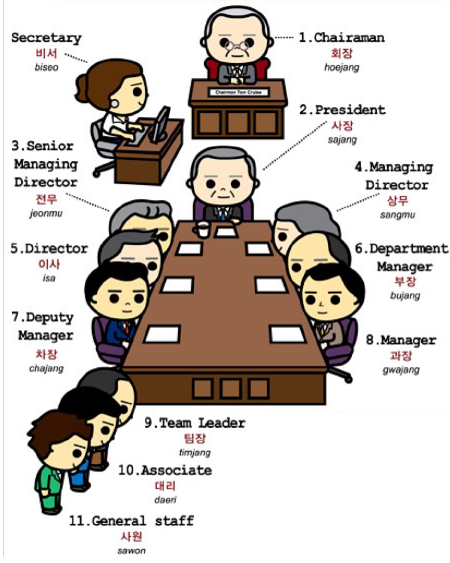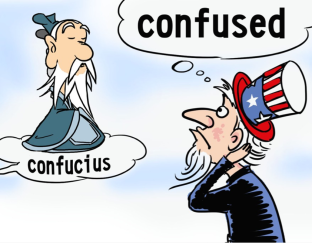When doing business in South Korea it is important to remember that this is a country with high power distance and hierarchy. Korean society can be characterised as quite unequal.
The high power distance/ hierarchy does not only exist in the personal life when it comes things like name addressing and way of greeting, but also in the business world, particularly negotiations.

For example, senior Korean officials will not deal comfortably with a junior member, no matter how qualified he may seem. Koreans value titles and status (Alston, 1989). Therefore, in order to cooperate successfully with South Korean companies be aware of the importance of hierarchy, and show your respect by sending the right officials to effectively negotiate the deals. Remember that decision making is often associated with senior management. But junior staff members can also be found quite helpful as they may possess more information, so make sure you engage with them as well (Chen, 2004).
Another important thing to remember is the role of Confucianism in the Korean life. It plays a significant role in both the personal lives and business world. Confucianism is an ancient Chinese way of thought that has spread through much of East Asia. The five disciplines of Confucianism became a way of living for many Koreans. They indicate the relationships between ruler and subject, parents and children, husband and wife, brothers and sisters, and friend and friend. Confucianism stresses duty, humility, harmony, loyalty, honour, respect for age and seniority, and sincerity (Cho and Yoon, 2001; Von Gilnow, Huo and Lowe, 1999).

Confucianism can explain why status, social contacts, relationships with others are so valuable in Korea. Korean status is determined by age, gender, education, family background, wealth, occupation, and political ideology. Social contacts determine success. Genealogy and backgrounds are important and determine how people are treated in the hierarchical society (Chaney and Martin, 2011). Since most Korean companies are family businesses (chaebols), it is also important to understand the importance of blood in their choice of employees and partner companies.
South Koreans tend to be very friendly, and their culture highlights the significance of teamwork and group ties. You are expected to consider the benefits and interests for the whole group, instead of pursuing your personal goals and objectives. This will help to ensure a long-term relationship with your new partners. Collectivist way of thinking is consistent with the concept of Kibun, as it focuses on treating everyone with respect, making sure that you are not disturbing anyone’s Kibun by embarrassing them or cause them losing face in public. Loyalty and trust are dominant characteristics of collectivist culture, and they tend to have power over other societal rules and regulations. The Korean society is built around an ideology where everyone takes responsibility for other members of the group (Aiken, 1995; Sama and Papamarcos, 2000; Yang, 2006).

The impact of this culture can be found in decision making and negotiations processes. South Koreans tend to take longer to make a final decision, because they need to consider others’ opinions and values. The decision is based on the careful deliberation of the interests of the whole team. This helps to ensure the stable Kibun environment. Therefore, when negotiating with South Koreans, be aware of this culture, and be patient during the negotiation process. Be prepared that the negotiation process may take more than one meetings to complete the deals. Make sure to learn and appreciate the collectivist philosophy, and try think in terms of the benefits for the whole team, to successfully negotiate business with Koreans.